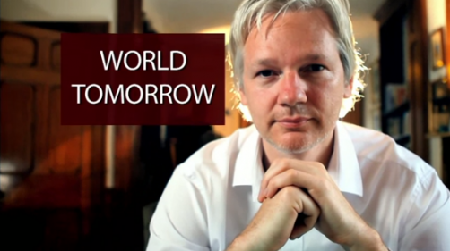 In the fourth episode of The World Tomorrow Julian Assange speaks with two leading Arab revolutionaries in the middle of conflict, Alaa Abd El-Fattah from Egypt and Nabeel Rajab from Bahrain.
In the fourth episode of The World Tomorrow Julian Assange speaks with two leading Arab revolutionaries in the middle of conflict, Alaa Abd El-Fattah from Egypt and Nabeel Rajab from Bahrain.
Alaa Abd El-Fattah is a long time Egyptian blogger, programmer and political activist. His parents were human rights campaigners under Anwar Sadat; his sister Mona Seif became a Twitter star during the 2011 Egyptian revolution, and is a founder of the No Military Trials for Civilians group formed under the post-Mubarak military junta.
El-Fattah was imprisoned for 45 days in 2006 for protesting under the Mubarak regime, and released after “Free Alaa” solidarity protests in Egypt and around the world.In 2011, from abroad, El-Fattah helped route around Mubarak’s internet blockade.
Nabeel Rajab is a lifelong Bahraini activist and critic of the Al Khalifa regime. A member of a staunch pro-regime family, Rajab has agitated for reform in Bahrain since his return from university in 1988. Along with the Bahraini-Danish human rights defender Abdulhadi al-Khawaja, he helped establish the Bahrain Centre for Human Rights in 2002. Rajab is reasonably new to the limelight — becoming a face for the Bahrain uprising of February 14 2011, after the sit-in at Pearl Roundabout. Since then, he has been a public face for the revolution, waging a social media war on Twitter with PR companies working for the regime.
After al-Khawaja was imprisoned, he led protests for his release. He has endured beatings, arrests and legal harrassment for engaging in pro-democracy demonstrations. On Saturday 5th of May, he was arrested at Manama airport , and charged the next day with encouraging and engaging in “illegal protests.” Nabeel Rajab remains in detention at the time of broadcast.
Credits: RT
Watch all episodes of Julian Assange.









